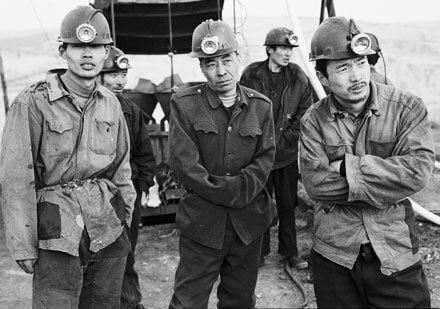Banned in China, a film examines the underside of mining life
Before the term “controversy” became a publicity buzzword for diets, music videos, and feature films, for certain artists it signified putting themselves at risk in order to bring their work into the world. Writer, director Li Yang deserves laurels for his small yet stirring directorial debut in “Blind Shaft” which created such legitimate controversy in his native China that the government banned his film.
Adapted from a novel by Liu Qingbang, “Blind Shaft” is a gritty fable of morality and murder. Set against the backdrop of China’s illegal mining and the nation’s deteriorating economy, the film is simple yet rife with social critique.
The film opens with the camera panning across a barren landscape in which the workers appear like drones about to begin their commute into a crevice in the earth. Three at a time, miners descend inside a dumb waiter-like cage into the abyss. The excavated shaft is an obviously unsafe place to work.
The first seven minutes of the film give viewers a gritty glimpse of China’s illegal mining industry which, according to the film’s press release, has claimed thousands of lives over the years.
Song Jinming (Li Yixiang) and Tang Zhaoyang (Wang Shuangbao) are miners and two-bit con men who make their living by profitably scamming the mining company. The duo scout and recruit desperate migrant workers in search of work. Once they find a likely candidate they promise the individual work and then convince the desperado to pose as a brother of one of the men, usually Tang. Feigning these blood relations, we later learn, equals compensation.
Once the newcomer is acclimated in the camp and has passed a requisite trial period, the scam begins. Song and Tang lure the third man into a far corner of the mine and club the unfortunate co-worker to death, quickly making the murder look like a mining accident. The pay off happens when the nervous mine owner compensates the “brother” of the victim to avoid a government investigation.
As Tang pretends to be distraught over his brother’s accidental death, Song plays the responsible friend––that is, middle man––between mine management and the victim’s brother. Negotiations ensue between the mine owner fearful of exposure of his illegal business and Song, who wants a high dollar amount for the distraught man and his family.
It’s a lucrative scam. The con men send home just enough money to help their families and keep enough to pay for trysts at a local brothel. The duo top off the evening crooning old Maoist anthems at a run-down karaoke lounge.
Although both men are evil con artists, they differ in character. Song, the younger of the two, is a family man with a young son. His conscience occasionally shines through. Tang, on the other hand, is a womanizer who can’t seem to get enough sexual fulfillment.
Over lunch, Tang spots his next victim, a doe-eyed 16-year-old boy named Yuan (Wang Baogiang) who’s just off a bus in search of work to pay for his sister’s schooling. Yaun is also the Chinese currency, so the young man truly represents profit.
Despite Song’s objection, Tang brings in Yuan as the next score.
Kind-hearted and innocent, Yaun is a likeable character. His colorful clothes makes him stand out a bit from the rest of the workers donned in tatters. Yaun is a hard worker, determined to pay his sister’s tuition.
As Song and Tang train him in the skills of mining, they secretly plan Yuan’s death in a secluded shaft. However, Song takes a liking to Yuan and becomes emotionally attached, which he tries to hide with tyrannical outbursts.
Song takes some heat from Tang for getting too close to the boy. Realizing the boy’s end is near, Song convinces Tang to allow Yaun to have sex with a prostitute at the brothel. Yaun’s ostensible loss of virginity occurs behind closed doors and whether the timid boy ever experiences sexual arousal is left unclear.
Nevertheless, Tang is ready to proceed with the dastardly plan to kill him. Song asks for yet one more night––for the boy to experience drunkenness––and Tang grudgingly complies.
Finally, Song can’t stall Tang, desperate for more hush money, any longer. Yaun’s day has come. Just like with their previous victims, Song and Tang lure Yaun to a distant corner of the mine.
Trick endings are for Hollywood. “Blind Shaft” avoids the let down and finishes with a mildly surprising twist.
A small film with a limited run, “Blind Shaft” won best narrative feature at last year’s Tribeca International Film Festival and the Silver Bear award at the Berlin Film Festival.
The director possesses an admirable visual sense. His use of metaphor is refreshing for a film this size. Combined with a strong plot that drives the story, as well as the film’s unpredictable ending, “Blind Shaft” is a must see.



































